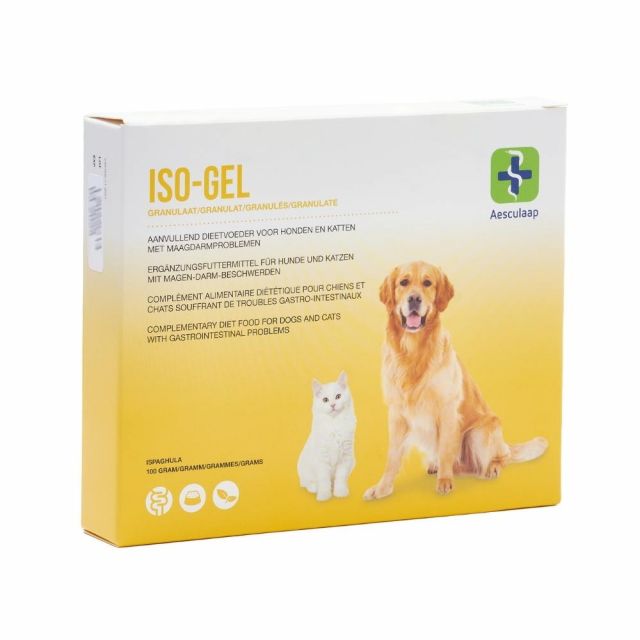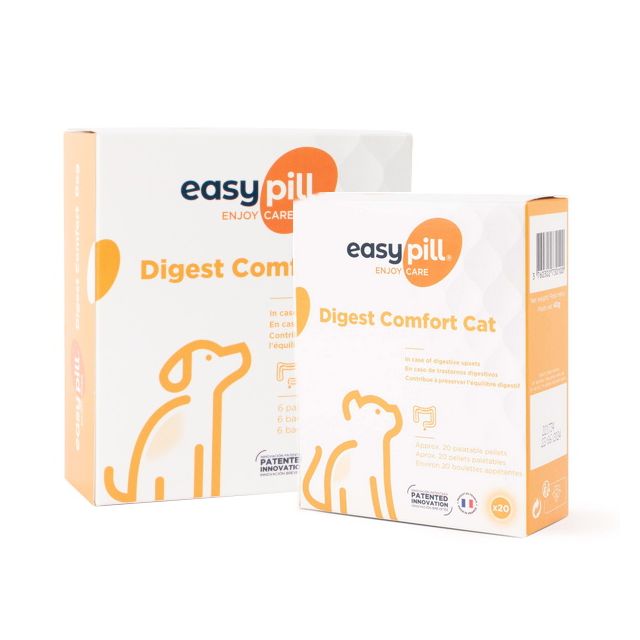Diarrhea in dogs
If your dog's stool is softer than usual, they are experiencing diarrhea. This is also true if there's blood or mucus in the stool, if your dog suddenly has yellow or green stools, or if your dog needs to defecate more frequently than usual. These symptoms are often categorized as 'diarrhea'.
Diarrhea is, of course, mainly annoying for your dog, but as an owner, it can also be inconvenient. Sometimes your dog may be so urgent that they can't hold it and have an accident in the house. Or they might whine you awake at night because they really need to go outside. Not to mention the smelly farts...
Fortunately, diarrhea usually resolves on its own within a few days. If your dog is otherwise healthy and fit, you don't always have to see a vet. Fortunately, you can also do something yourself! Pharmacy4pets offers a wide range of products for stomach and intestinal problems in dogs.
Causes of Diarrhea in Dogs
Diarrhea can have many different causes and it's not always easy to find out why your dog has abnormal stools. Some common causes of diarrhea in dogs include:
-
Eating or drinking something wrong: This is the most common cause of intestinal inflammation and diarrhea. Some examples include eating feces, something from the street, or drinking dirty water. Very fatty or spicy (human) food or very cold food or drink can also lead to diarrhea. Raw dog foods often contain bacteria. Often this is fine, but if the meat is stored improperly, your dog is sensitive to it, or there are too many bacteria, your dog can also get diarrhea from eating raw food.
-
Viruses or parasites: Your dog can get infected by eating or licking feces from other animals or drinking contaminated water. A common example is giardia in dogs.
-
Food intolerance or sensitivity: If your dog has a food allergy or intolerance, their immune system 'overreacts' to one or more components of the food.
If your dog has a food sensitivity, hypoallergenic food is the solution: Sanimed Hypoallergenic Sausage or Sanimed Hypoallergenic dry food. -
Stress and excitement: Nervous or very active dogs often have diarrhea. Often the first stool is fine, but as the walk progresses or the stress increases, the stool becomes thinner. In addition to rest and training, sometimes adding fibers such as Iso-Gel to the food helps.
-
Antibiotics or other medication: There are many bacteria living in your dog's intestine (also known as the gut flora or the microbiome). Antibiotics not only kill the bad bacteria, but also the good ones. If there is a shift in the composition of the microbiome, this can easily lead to diarrhea. Probiotics for dogs can help restore balance.
-
Causes outside the gastrointestinal tract (e.g., pancreas, kidneys, liver).
Treatment of Diarrhea
Since there are so many causes of diarrhea, there are also many potential treatments. Fortunately, you can do a lot to support your dog with diarrhea. For chronic diarrhea or if your dog is ill, the vet will initiate treatment.
Adjusting the Diet
If your dog has diarrhea and is otherwise fit and healthy, the advice is to feed smaller portions more often per day and to stop snacks. You can give your dog its regular food or opt for an easily digestible food such as Sanimed Intestinal dog. Still, people often quickly advise giving dogs with diarrhea chicken and rice. Although this is indeed easy to digest, it contains far fewer nutrients than dog food. And the intestinal cells need extra nutrients for a quick recovery!
If your dog is getting raw meat, it is better to heat it temporarily to reduce the number of bacteria your dog ingests. To help thicken the stool, adding water-binding fibers, such as Iso-Gel is helpful.
For chronic or more severe diarrhea, the vet may prescribe a special diet or supplements. Hypoallergenic food, highly digestible food, food with a specific fiber composition, a reduced fat content, a kidney diet, or extra pancreatic enzymes are examples of dietary measures that may be necessary.
Fasting is not a good idea! The sick intestine actually needs nutrients to recover faster. Fasting is only advised for persistent vomiting (but in that case, you should definitely take your dog to the vet!)
Probiotics for Dogs
If your dog has (quick) diarrhea, there is almost always a disruption of the microbiome. A probiotic supplements the good bacteria and provides them with the right nutrients, so the balance is quickly restored. It can also be beneficial to give a probiotic after a course of antibiotics.
Specific Treatments for Diarrhea
If there is a clear cause of diarrhea, it will be addressed directly with, for example, deworming your dog, a remedy against giardia such as Panacur, anti-inflammatory drugs, or antibiotics.
Support measures such as an IV, vitamin B12 or anti-nausea drugs may sometimes be necessary if your dog is very sick.
Preventing Diarrhea
By taking some measures, you can reduce the chance of diarrhea in your dog:
- Prevent your dog from eating anything off the street and from drinking stagnant water.
- Do not feed your dog human food. Food for humans is often too spiced, too fatty, and too salty for dogs.
- Feed your dog a good complete dog food. Good food is the basis for a healthy gastrointestinal system. Keep in mind that switching to a different food can lead to softer stools. Especially in dogs with a sensitive gastrointestinal system, it is good to always gradually transition, over a week.
- Regularly deworm your dog.
- Consider probiotics as a support for a healthy gut flora.
When is the Best Time to Visit the Vet for Diarrhea?
If your dog is very lethargic or appears to have abdominal pain, does not want to eat or eats much less, loses weight, or if your dog is vomiting, that is a reason to visit the vet in case of diarrhea. Also, if there is blood in the stool or if the diarrhea lasts longer than three to five days. Puppies with diarrhea or very old dogs weaken more quickly, so do not wait too long with a vet visit.
If your dog unfortunately gets diarrhea, Pharmacy4pets has a wide range of products to support your dog's gastrointestinal system. If you have a question about our products or about diarrhea in your dog, please contact us.


